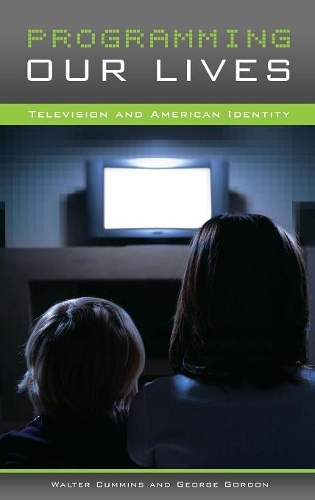
Programming Our Lives: Television and American Identity
(Hardback)
Publishing Details
Programming Our Lives: Television and American Identity
By (Author) Walter Cummins
By (author) George Gordon
Bloomsbury Publishing PLC
Praeger Publishers Inc
30th June 2006
United States
Classifications
General
Non Fiction
Popular culture
791.4575
Physical Properties
Hardback
240
Description
In this timely examination of television and American identity, Cummins and Gordon take readers on an informed walk through the changes that TV has already wrought-and those still likely to confront us. Commercial television in America is less than 60 years old, yet it has had an enormous impact on what we like, what we do, what we know, and how we think. A family transplanted from the 1940s to the present day would certainly be stunned by a fundamentally different world: instead of gathering in the living room for a shared evening of radio, they would be scattered around the house to indulge their individual interests on one of a hundred cable channels; instead of a society with rigid racial and ethnic divisions, they would see people of different ethnicities in passionate embraces; and certainly they would see very different sets of values reflected across the board. They would, in short, find themselves in an unrecognizable America, one both reflected in and shaped by television, a medium that has been shown to have an unprecedented influence on our lives both for better and for worse. By focusing on the development of television within the cultural context that surrounds it, and drawing on such phenomena as quiz shows, comedy hours, the Kennedy assassination, the Olympics, sitcoms, presidential ads, political debates, MTV, embedded journalism, and reality TV, the authors reveal television's impact on essential characteristics of American life. They cover topics as diverse as politics, crime, medicine, sports, our perceptions, our values, our assumptions about privacy, and our unquenchable need for more things. In addition, they consider the future of the medium in the light of the proliferation of programming options, the prevalence of cameras and receivers in our lives, the growing links between TV and computers, and the crossed boundaries of television throughout the world.
Reviews
Television has become such an everyday presence in contemporary America that most people take it for granted, rarely considering the role it has played in the ways society has changed in the past 60 years, according to Cummins and Gordon, a management consultant. They investigate television's impact on American news media, politics, and education; on attitudes toward law, crime, medicine, and sports; and on social interaction and perceptions. By shedding light on television's influence and suggesting ways to be more sophisticated viewers, the authors aim to encourage readers to be more effective parents, consumers, voters, and citizens. * Reference & Research Book News *
Author Bio
Walter Cummins is Professor Emeritus of English at Farleigh Dickinson University's College at Florham, and Editor Emeritus for The Literary Review: An International Journal of Contemporary Writing. He is the co-author of The Literary Traveler with Thomas E. Kennedy, and the author of the story collections Witness and Where We Live. He serves on the editorial boards of Web Del Sol, Tiferet magazine, and the Fairleigh Dickinson University Press. George Gordon has pursued a distinguished career as a partner of Hay Management Consultants, and president of its Research for Management Division. He was also a member of the faculty of Rutgers University, and a board member of a number of organizations. Over 50 of his articles and speeches have appeared in numerous business magazines, professional publications and books. These span such publications as Academy of Management Review, Directors and Boards, Research-Technology Management, and International Journal of Business. His previous book, Managing Management Climate, was co- authored with Walter Cummins.
